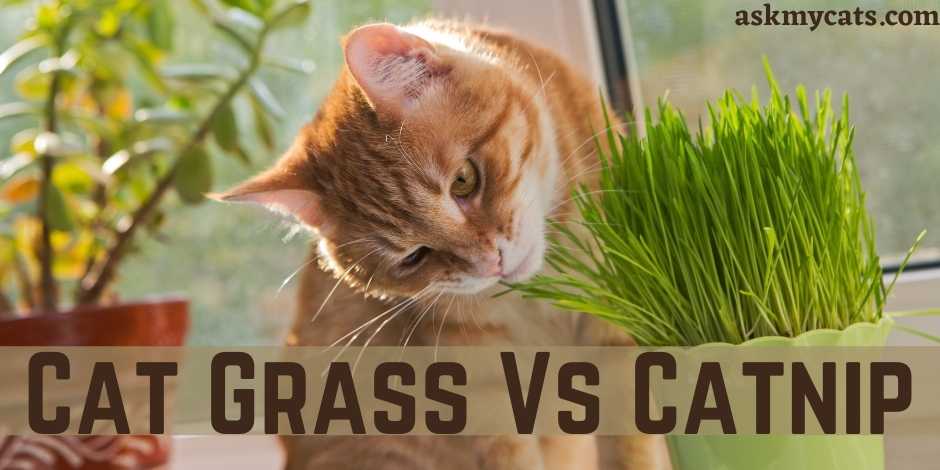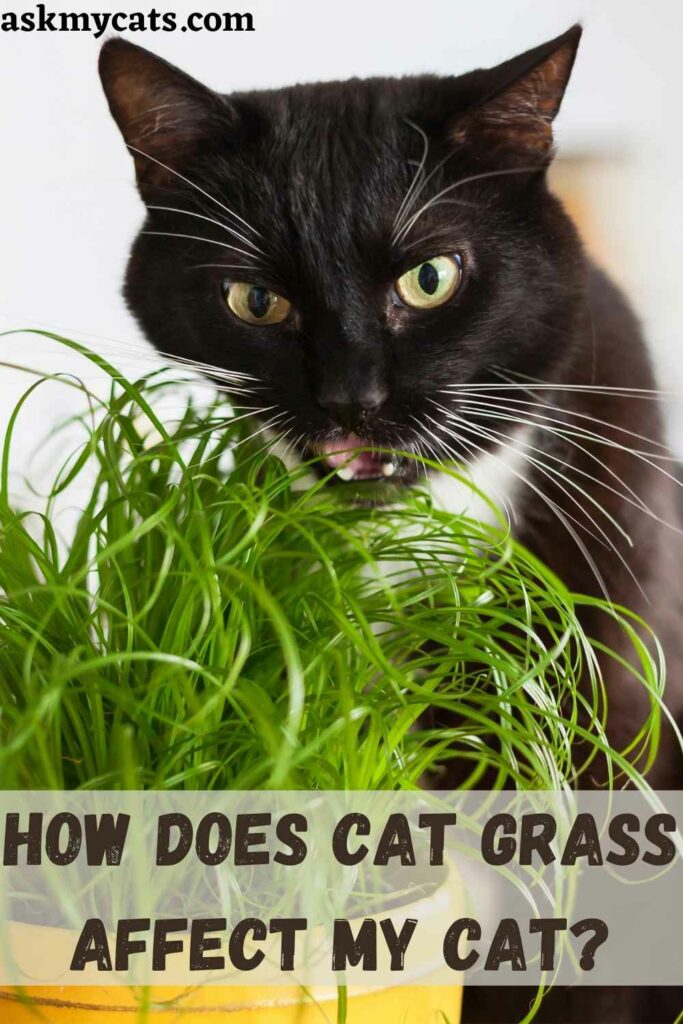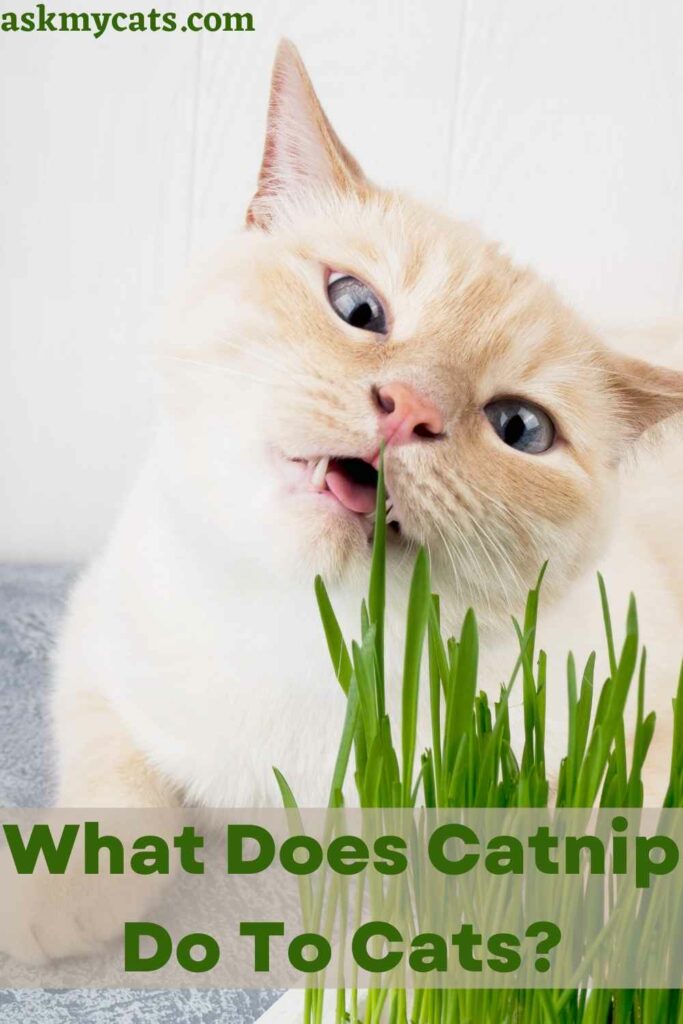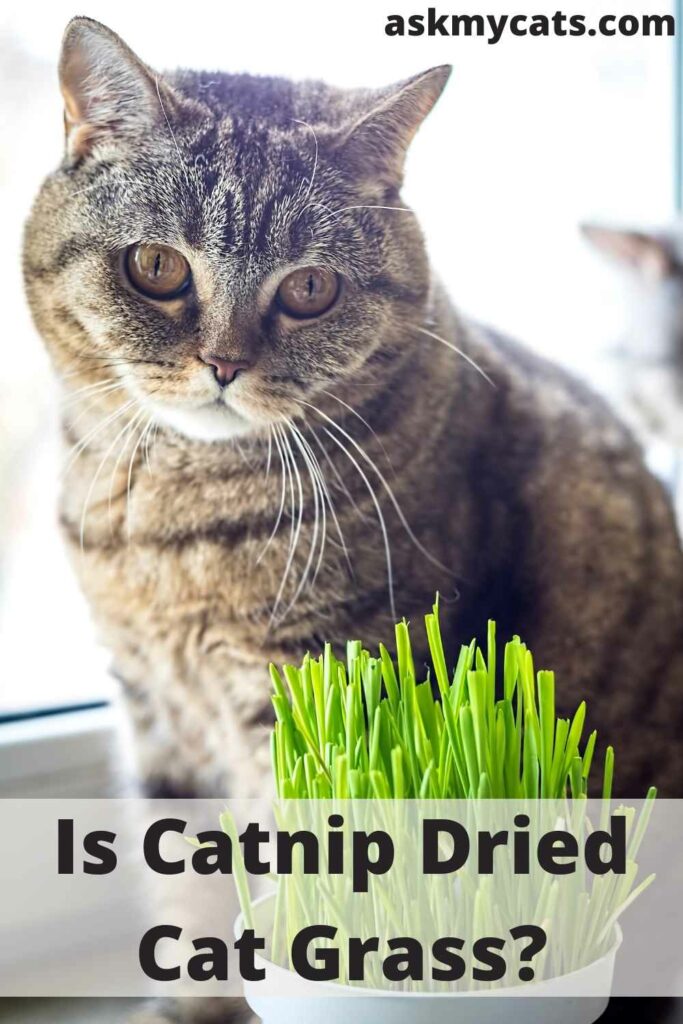Many individuals are unable to distinguish between Cat grass and Catnip and what is best suited for your feline friend. As a result, we’ve prepared this article to assist you in figuring this out.
Cat grass and catnip are two different plants that your cat may like. The main difference between cat grass and catnip is that Cat grass is usually a variety of various grasses that can be cultivated indoors, such as rye, oat, barley, or wheatgrass while catnip is a plant that is related to mint.
This article will talk about the differences between cat grass and catnip, and which one is more suitable for your cat.


Give Your Cat the Perfect Day
Get the Free Ebook!
What Is Cat Grass?
Cat grass is grass grown from rye, barley, oat, wheat, or alfalfa seeds that are safe for cats.
Cat grass is a mixture of various grasses that are cultivated from seeds. This grass is grown indoors, which distinguishes it from lawn grass, which does not contain chemicals and has unique grass varieties.
Cat grass is a great alternative for most cats that don’t like to bother with regular houseplants. There are other advantages as well.
Cat grass is not to be confused with catnip, which is a mint family member. Cat grass is normally grown from the seeds of rye, barley, oat, or wheat.
At your local pet store, you’ll discover a selection of kitty grass kits that include everything you need, including seeds, soil, and a potting container.
All you’ll need is water and sunlight, and your cat will have her own organic garden for safe, healthy munching in less than a week.
Check out more details about Can Cats Eat Wheatgrass? Is Wheatgrass Good For Cats?
Is Cat Grass Toxic?
No, cat grass is not toxic to cats.
Cat grass is a safe alternative to outdoor grass, which can be treated with weed killers or other pesticides, and certain toxic houseplants.
It gives your cat a chance to engage in natural behavior. An indoor garden provides a healthy alternative to nibbling on the neighbor’s possibly pesticide-laced lawn for outdoor cats.
It provides a delicious taste of the outdoors for indoor cats.
One common misconception about cats is that they only eat grass when they are sick, but research shows that this is not the case. Cat grass benefits your kitty’s life in addition to providing entertainment by aiding her digestive system.
Also, check out alfalfa grass for cats
What Happens If A Cat Has Cat Grass Overdose?
If a cat overdoses on cat grass it could have symptoms like lethargy and lack of appetite, but they should only last for a day or two at max.
Hairballs are an unavoidable part of cat ownership, especially if your cat is a long-haired breed or sheds a lot. Cat grass will speed up the process, especially if she consumes a large amount at once.
“After munching on grass for a while,” Animal Planet observes, “cats inevitably upchuck those greens a short time later.”
Your cat will not vomit every time she nibbles on her grass, but if she does, or if you see grass blades in her vomit, it’s a sign that something is clogged.
There is no set amount of cat grass that should be planted, but most experts, recommend planting a handful of seeds at a time. If you have several cats, consider giving each one her own patch of grass to avoid competition.
Cat grass is safe, as long as you buy the right kit or seeds and, as always, keep an eye on your cat’s habits and health. If you notice anything out of the ordinary, contact your veterinarian as soon as possible.
Also, check out Can Cats Eat Barley
Can Cats Digest Cat Grass
Yes, most cats can digest cat grass.
You might be wondering if cats can digest cat grass because they are obligate carnivores. Some cats will regurgitate the grass, while others will be completely uninterested. If they eat it, it can serve as a laxative to help them get rid of the waste in their system.
It’s a widely held belief among pet owners that our four-legged pets only eat cat grass when they’re sick. Some cats, on the other hand, simply like snacking on it.
How Does Cat Grass Affect My Cat?
Cat grass affects your cat in several ways, some of them are: –

1. Digestion
Even cats on a healthy, balanced diet can benefit from cat grass since the fiber helps to speed up the digestion process.
If your cat eats a lot of grass, it’s possible that they don’t get enough fiber in their diet.
If you find your cat eating a lot of grass, consult your veterinarian to verify they are getting enough vitamins and nutrients.
2. Induce Vomiting
Cats who have eaten something that does not agree with them, such as allergic or indigestible matter, may eat cat grass to induce vomiting in order to rid their system of any potential toxins and settle their stomach.
Vomiting will not suffice to treat a serious toxic event. Vomiting on a regular basis should always be treated as a medical emergency.
A cat that vomits more than three times per day should be examined by a veterinarian.
More frequent vomiting, for example, more than once an hour, indicates that your cat has consumed something toxic. You should seek veterinary care right away.
3. Fur Balls
Indoor cats groom themselves for roughly 60% of the day, making them prone to hairballs. Grass eating can aid in digestion and help them cough up hairballs.
If your cat eats cat grass on a regular basis, it may help to prevent hairball buildup in their stomach.
4. Keeps Them Healthy
Cat grass provides your cat with an extra dose of certain vitamins and minerals, particularly folic acid, a B vitamin complex.
This component can assist your cat’s body in producing red blood cells, which allow oxygen to be transported throughout the body, as well as assist your cat’s body in DNA repair.
Even chlorophyll, the green pigment that gives cat grass its color, has anti-inflammatory properties. This pigment may act as a breath freshener and has been linked to decreased pain responses.
Also, check out Oat Grass For Cats: Is Oat Grass Good For Cats?
Is Catnip Safe For Cats?
Yes, catnip is safe for cats.
Catnip is extremely safe for cats. In the worst-case scenario, if your cat is exposed to enormous doses of catnip, he or she may become irritated or disturbed. You could also have one of the 50% of cats who have no reaction or change in behavior.
Even when ingested, catnip is not toxic to cats. Catnip’s euphoric effects are short-lived and harmless to cats. Catnip is not addictive, and no evidence of long-term effects has been found.
Cats may appear “high” after being exposed to catnip, which concerns cat lovers. Although we may never know exactly how catnip affects cats, there is no evidence that it is harmful or addictive.
It is up to you to determine how and when to give your cat a catnip. If you are unsure, seek advice from your veterinarian.
What Does Catnip Do To Cats?
The catnip contains nepetalactone which causes most cats to experience euphoria after smelling or ingesting the herb.

Cats typically respond to the herb by sniffing it, rubbing their heads and face on it, rolling around, vocalizing, playing, running, scratching, and even eating it.
It appears to be a pleasurable response related to psychosexual stimulation.
The reaction to catnip, on the other hand, is not dependent on the cat’s reproductive ability; spayed and neutered cats react equally to the herb.
Catnip’s effects typically last up to 15 minutes. Following the euphoric experience, many cats will nap.
Some cats will experience only sleepiness and relaxation after being exposed to catnip, rather than excitement and playfulness.
It is perfectly normal for different cats to react differently to catnip.
Some cats may even benefit from the use of catnip. Indoor cats frequently require additional enrichment to keep them active and content.
Catnip can help stimulate cats’ minds and bodies, resulting in happier, healthier cats. Using catnip on cat scratchers can entice them to scratch in these areas while discouraging destructive scratching.
Catnip does not work on all cats. Some cats are born without the characteristics that cause them to respond to nepetalactone.
Catnip usually has no effect on young kittens. Some will respond as early as six weeks of age, but it may take up to eight months for them to develop an interest in the herb.
Do Cats Prefer Cat Grass Or Catnip?
Cats prefer catnip over cat grass, as it contains nepetalactone that can cause a cat to go crazy over it.
Some cats may be drawn to cat grass, but almost all cats are drawn to catnip as it causes most cats to experience euphoria after smelling or ingesting the herb.
The most intense catnip experience begins with the nose—one whiff of the stuff and your cat will immediately go crazy.
Catnip is thought to target feline “happy” receptors in the brain. Catnip, on the other hand, has the opposite effect when eaten, and your cat relaxes.
Catnip causes most cats to roll, flip, rub, and eventually zone out. They have the ability to meow and growl at the same time. Other cats become hyperactive or even aggressive when you approach them.
Typically, these sessions last about 10 minutes before your cat loses interest. It could take up to two hours for him to “reset” and become susceptible to catnip once more.
However, cats are unlikely to overdose on catnip, but they can become ill if they consume too much. You can rely on your cat to tell you when they’ve had enough.
Is Catnip Dried Cat Grass?

No, catnip is not dried cat grass. They both belong to separate plant families.
Sure, everyone who owns a cat—and even those who don’t—have heard of catnip.
It’s been around for what seems like an eternity in the cat world. It was even thought to help humans with ailments once upon a time.
You may believe that cat grass is simply another name for catnip. After all, it’s clearly a cat plant.
This is not the case—it is completely different.
Which One Is Better For Cat: Cat Grass Or Catnip?
There is no concrete answer to whether cat grass or catnip will be better for your cat, it depends on your cat’s needs.
If your cat has issues with digestion and or it wants to prevent hairball buildup in its stomach, then the better choice would be to go for cat grass.
As it can help in inducing vomit which can help your cat with its digestion and prevention of hairball buildup in its stomach.
On the other hand, if your cat has anxiety issues or has aggressive behavior, catnip would be an ideal choice. Catnip can help cats relax and play, which can both help reduce stress and anxiety. Catnip is available in dry form for sprinkling on scratching pads or your cat’s bed.
Some differences between catnip and cat grass are: –
| Catnip Vs Cat Grass | Catnip | Cat Grass |
|---|---|---|
| Toxicity | Non-Toxic | Non-Toxic |
| Usage | Can be eaten or rolled in | Meant to be eaten |
| Safe to eat | Yes | Yes |
| Affects | Mind-altering | No mental change |
| Origin | Medicinal herb | Grown indoors |
Frequently Asked Questions
How to give catnip to cats?
There are several safe ways to give catnip to your cat. Catnip comes in a variety of forms. It can be grown and dried at home, bought dry, or bought as a potted plant. There are several methods for providing your cat with catnip. It is safe to use on cat furniture, beds, and scratching pads. Dried catnip can even be used to “marinate” cat toys. If your cat likes to chew on plants, try growing a small pot of fresh catnip to give to your cat on occasion.
Is catnip a drug?
Catnip is similar to a drug for cats in some ways. For about 20 minutes, it changes the brain and temporarily alters behavior. There is a component of catnip that is appealing to a cat’s sensory system. It’s known as nepetalactone. Interestingly, signs of catnip exposure are hereditary and do not appear in kittens until they are at least 3 months old. When cats are exposed to catnip, it is estimated that half of them have no reaction.
Is having cat grass at home a good idea?
Knowing the benefits it can provide to cats, it is recommended that we have cat grass at home if the cat does not have access to the outdoors. There are products on the market that allow you to plant them at home, and it will also help them to stay away from the plants that we want to keep safe.
Final Words
Cat grass and catnip are two possibilities for giving your cat a taste of the outdoors. Cat grass has a number of health benefits, including aiding in the regulation of your cat’s gastrointestinal system.
Catnip is a stimulant that can be used as a form of positive reinforcement and to increase activity in cats.
If you have any unanswered questions, ask us in the comments section.
You might also like to know the difference between cat grass vs wheatgrass
